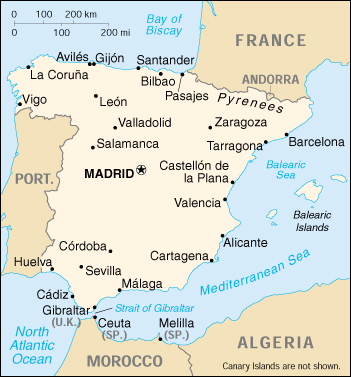

Status Quo Side: Spanish government
Non-Status Quo Side: Basque separatists
Region: Europe
Conflict Type: Primarily Internal
Issues in Dispute: Ethnic, Independence
The ethnically, linguistically distinct Basque provinces in northeast Spain and southwest France have sought independence over two centuries. Spanish dictator Francisco Franco's military in the mid-1930s exiled the autonomous Basque government and repressed political and cultural expression. Opposition groups included the PNV, or Basque Nationalist Party, founded in 1895, and the ETA, or Basque Homeland and Freedom, founded on July 31, 1959 after the PNV's failure to absorb Bilbao youth seeking since 1952 to raise Basque national consciousness.
After a popular ETA activist Xabi Etxebarrieta was killed by police, the ETA in August 1968 assassinated a widely disliked police inspector. The Franco government put the entire Basque region under prolonged siege. Thousands were jailed, tortured, and exiled, culminating in the 1970 Burgos trial and imprisonment of over a dozen ETA leaders. The ETA acquired new recruits and a new leader, Eustakio Mendizabal.
In December 1973 the ETA assassinated Spanish premier Luis Carrero Blanco. After Franco's death in 1975 a split occurred over strategy and tactics between a military wing (ETA-m) committed to armed struggle, and a politico-military wing (ETA-p-m) which was more conciliatory and anti-violent. In 1980, the post-Franco government granted limited autonomy to the Basque region, and by 1982 the pro-negotiation faction had foresworn violence, though not independence, in exchange for amnesty for imprisoned or exiled members. A regional Parliament was elected. But the ETA, increasingly Marxist-Leninist rather than nationalist, and the secret government death squads, kept tensions high. In the late 1980s France ceased offering asylum to guerrillas finding refuge among French Basques. All settlement efforts foundered on the issue of violence.
A failed ETA attempt in April 1995 on the life of Prime Ministerial candidate Jose Aznar revealed declining popular support for terrorism. An ETA offer to end violence in return for independence and amnesty was denied. Following an attempt on the life of King Juan Carlos in August 1995, and the murders of two socialists in December and in February 1996, some 50,000 marched in Madrid in silence to protest. Meanwhile a Supreme Court investigation of official involvement in an undercover Interior Ministry "Anti-Terrorist Liberation Group" (GAL), operating since 1982 against Basque rebels, helped bring down the Gonzales government in March 1955. By February, 1997 with the conservative Aznar government in power, secret intelligence reports were publicized of deep government involvement in anti-ETA death squads. But by July, 1997, with the kidnapping and brutal murder of councilor Miguel Angel Blanco, opinion had decisively shifted. Enormous public demonstrations showed the country - including many Basques - fed up with ETA violence and terrorism.
ETA announced an unconditional and indefinite ceasefire. Inconclusive talks were held in Switzerland in May, 1999 between Madrid and the ETA.
The ETA announced that it was abandoning the cease-fire and resuming its armed struggle, blaming Spanish and French police repression plus failure of Basque moderates to work toward independence. Domestic and international condemnation was immediate.